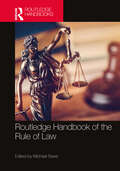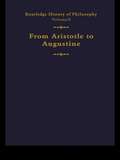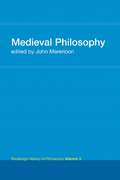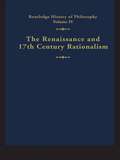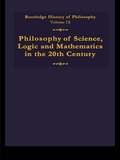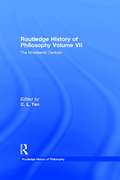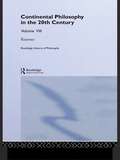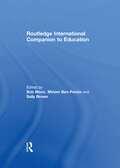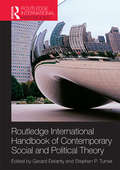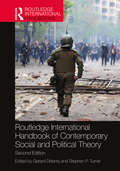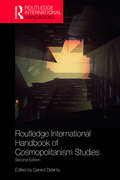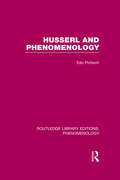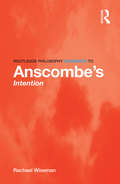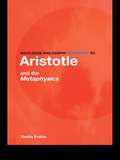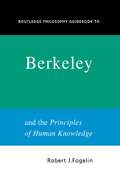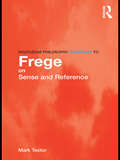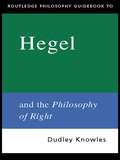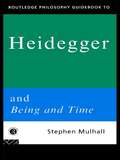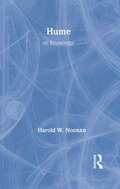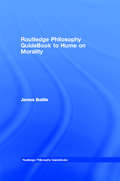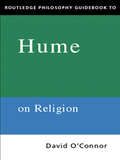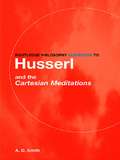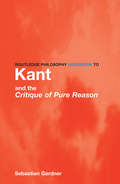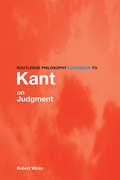- Table View
- List View
Routledge Handbook of the Rule of Law (Routledge Handbooks in Law)
by Michael SevelThis Handbook provides a state-of-the-art survey of the study of the rule of law across law, the humanities, and social sciences, as well as insights into the practice of building the rule of law within and among states. Its 28 chapters are by many of the world’s leading scholars of the rule of law, as well as distinguished junior scholars, from a dozen countries and representing a number of academic disciplines. The chapters are ordered to progress, first, from theory to the practice of the rule of law and, second, from the rule of law within, to beyond, the state. They divide into three parts. The first part examines the concept, history, and value of the rule of law. This section considers the importance of political and intellectual history in shaping the concept over the centuries and takes novel philosophical approaches to the connection between the rule of law and other important ideals such as justice, equality, and civil disobedience. The second part transitions from theoretical studies to accounts of practical exercises in building the rule of law. The chapters consider the challenges of rule of law reform, including the use of local intermediaries facilitating interactions between international legal aid organizations and state governments, the challenges of legal translation across vastly different societies, the pathways of knowledge among the powerless about the protective potential of the rule of law, as well as the possible future for artificial intelligence systems in helping to reinforce rule-of-law principles. The third part examines the rule of law from a number of perspectives within particular supranational and national states, such as the European Union, China, Singapore, and South Africa, among others, and concludes by considering the prospects of the rule of law beyond the state, both within and among international institutions such as the United Nations, as well as non-territorial spaces like the world’s oceans. This Handbook is aimed at rule of law scholars across law, the humanities, and the social sciences, law and development practitioners, policymakers, and advanced students and researchers who seek a state-of-the-art overview of the history, theory, and practice of the rule of law.
Routledge History of Philosophy Volume II: Aristotle to Augustine (Routledge History of Philosophy #Vol. 2)
by David FurleyThe final volume to be published in the acclaimed Routledge History of Philosophy series provides an authoritative and comprehensive survey and analysis of the key areas of late Greek and early Christian Philosophy.
Routledge History of Philosophy Volume III: Medieval Philosophy (Routledge History of Philosophy)
by John MarenbonThe philosophy discussed in this volume constitutes the intellectual and philosophical ideas of the medieval era, from Aquinas and Anselm, the intellectual philosophy of the Judaic and Arabic traditions, the Twelfth Century Renaissance and the philosophical ideas associated with the emergence of the universities. This volume provides a broad and scholarly introduction to the major authors and issues involved in the philosophical discourse of the medieval era, as well as some original interpretations of the philosophical writings addressed. It includes a glossary of technical terms and a chronological table of philosophical and other cultural events.
Routledge History of Philosophy Volume IV: The Renaissance and Seventeenth Century Rationalism (Routledge History of Philosophy)
by G. H. R. ParkinsonFirst published in 1993. Routledge is an imprint of Taylor & Francis, an informa company.
Routledge History of Philosophy Volume IX: Philosophy of the English-Speaking World in the Twentieth Century 1: Science, Logic and Mathematics (Routledge History of Philosophy)
by Stuart. G. ShankerVolume 9 of the Routledge History of Philosophy surveys ten key topics in the philosophy of science, logic and mathematics in the twentieth century. Each of the essays is written by one of the world's leading experts in that field. Among the topics covered are the philosophy of logic, of mathematics and of Gottlob Frege; Ludwig Wittgenstein's Tractatus; a survey of logical positivism; the philosophy of physics and of science; probability theory, cybernetics and an essay on the mechanist/vitalist debates.The volume also contains a helpful chronology to the major scientific and philosophical events in the twentieth century. It also provides an extensive glossary of technical terms in the notes on major figures in these fields.
Routledge History of Philosophy Volume VII: The Nineteenth Century (Routledge History of Philosophy)
by C. L. TenThe Nineteenth Century provides a broad, scholarly introduction to nineteenth-century philosophy. It also contains a glossary of philosophical terms and a chronological table of philosophical and cultural events.
Routledge History of Philosophy Volume VIII: Twentieth Century Continental Philosophy (Routledge History of Philosophy)
by Richard KearneyFirst published in 1994. Routledge is an imprint of Taylor & Francis, an informa company.
Routledge International Companion to Education
by Sally Brown Bob Moon Miriam Ben-PeretzThe Routledge International Companion to Education addresses the key issues underpinning the rethinking and restructuring of education at the beginning of the new millennium. The volume contains over fifty major contributions exploring a wide range of issues, including:* philosophy of education* the economics and resourcing of education* testing and assessment: current issues and future prospects* standards* multiculturalism* anti-racism* computers in classrooms* mother tongue education* civics and moral education.Each chapter gives a contemporary account of developments in the field, and looks to the future and the directions that new activity and inquiry are likely to take. All the chapters are written from an international perspective.
Routledge International Handbook of Contemporary Social and Political Theory (Routledge International Handbooks)
by Gerard Delanty Stephen P. TurnerThe triangular relationship between the social, the political and the cultural has opened up social and political theory to new challenges. The social can no longer be reduced to the category of society, and the political extends beyond the traditional concerns of the nature of the state and political authority. This Handbook will address a range of issues that have recently emerged from the disciplines of social and political theory, focusing on key themes as opposed to schools of thought or major theorists. It is divided into three sections which address: the most influential theoretical traditions that have emerged from the legacy of the twentieth century the most important new and emerging frameworks of analysis today the major theoretical problems in recent social and political theory. The Routledge International Handbook of Contemporary Social and Political Theory encompasses the most up-to-date developments in contemporary social and political theory, and as such is an essential research tool for both undergraduate and postgraduate students, as well as researchers, working in the fields of political theory, social and political philosophy, contemporary social theory, and cultural theory.
Routledge International Handbook of Contemporary Social and Political Theory (Routledge International Handbooks)
by Gerard Delanty Stephen P. TurnerThe triangular relationship between the social, the political, and the cultural has opened up social and political theory to new challenges. The social can no longer be reduced to the category of society, and the political extends beyond the traditional concerns of the nature of the state and political authority. This Handbook will address a range of issues that have recently emerged from the disciplines of social and political theory, focusing on key themes as opposed to schools of thought or major theorists. It is divided into three sections which address: the most influential theoretical traditions that have emerged from the legacy of the twentieth century; the most important new and emerging frameworks of analysis today; the major theoretical problems in recent social and political theory. The Second edition is an enlarged, revised, and updated version of the first edition, which was published in 2011 and comprised 42 chapters. The new edition consists of 50 chapters, of which seventeen are entirely new chapters covering topics that have become increasingly prominent in social and political theory in recent years, such as populism, the new materialism, postcolonialism, Deleuzean theory, post-humanism, post-capitalism as well as older topics that were not covered in the first edition, such as Arendt, the gift, critical realism, anarchism. All chapters retained from the first edition have been thoroughly revised and updated. The Routledge International Handbook of Contemporary Social and Political Theory encompasses the most up-to-date developments in contemporary social and political theory, and as such is an essential research tool for both undergraduate and postgraduate students as well as researchers working in the fields of political theory, social and political philosophy, contemporary social theory, and cultural theory.
Routledge International Handbook of Contemporary Social and Political Theory (Routledge International Handbooks)
by Gerard Delanty Stephen P. TurnerThe triangular relationship between the social, the political, and the cultural has opened up social and political theory to new challenges. The social can no longer be reduced to the category of society, and the political extends beyond the traditional concerns of the nature of the state and political authority.This Handbook will address a range of issues that have recently emerged from the disciplines of social and political theory, focusing on key themes as opposed to schools of thought or major theorists. It is divided into three sections which address: the most influential theoretical traditions that have emerged from the legacy of the twentieth century the most important new and emerging frameworks of analysis today the major theoretical problems in recent social and political theory The Second edition is an enlarged, revised, and updated version of the first edition, which was published in 2011 and comprised 42 chapters. The new edition consists of 50 chapters, of which seventeen are entirely new chapters covering topics that have become increasingly prominent in social and political theory in recent years, such as populism, the new materialism, postcolonialism, Deleuzean theory, post-humanism, post-capitalism as well as older topics that were not covered in the first edition, such as Arendt, the gift, critical realism, anarchism. All chapters retained from the first edition have been thoroughly revised and updated.The Routledge International Handbook of Contemporary Social and Political Theory encompasses the most up-to-date developments in contemporary social and political theory, and as such is an essential research tool for both undergraduate and postgraduate students as well as researchers working in the fields of political theory, social and political philosophy, contemporary social theory, and cultural theory.
Routledge International Handbook of Cosmopolitanism Studies: 2nd edition (Routledge International Handbooks)
by Gerard DelantyCosmopolitanism is about the extension of the moral and political horizons of people, societies, organizations and institutions. Over the past 25 years there has been considerable interest in cosmopolitan thought across the human social sciences. The second edition of the Routledge International Handbook of Cosmopolitanism Studies is an enlarged, revised and updated version of the first edition. It consists of 50 chapters across a broader range of topics in the social and human sciences. Eighteen entirely new chapters cover topics that have become increasingly prominent in cosmopolitan scholarship in recent years, such as sexualities, public space, the Kantian legacy, the commons, internet, generations, care and heritage. This Second Edition aims to showcase some of the most innovative and promising developments in recent writing in the human and social sciences on cosmopolitanism. Both comprehensive and innovative in the topics covered, the Routledge International Handbook of Cosmopolitanism Studies is divided into four sections. Cosmopolitan theory and history with a focus on the classical and contemporary approaches, The cultural dimensions of cosmopolitanism, The politics of cosmopolitanism, World varieties of cosmopolitanism. There is a strong emphasis in interdisciplinarity, with chapters covering contributions in philosophy, history, sociology, anthropology, media studies, international relations. The Handboook’s clear and comprehensive style will appeal to a wide undergraduate and postgraduate audience across the social and human sciences.
Routledge Library Editions: Phenomenology (Routledge Library Editions: Phenomenology)
by VariousReissuing works originally published between 1970 and 1995, Routledge Library Editions: Phenomenology (14 volume set) offers a selection of scholarship covering this important branch of philosophy and method. Volumes cover theories of Husserl and Heidegger, and branch out to such topics as psychology, Marxism, language and emotion, and education, forming a varied and informative collection of previously out-of-print works.
Routledge Philosophy GuideBook to Anscombe's Intention (Routledge Philosophy GuideBooks)
by Rachael WisemanG. E. M. Anscombe’s Intention is a classic of twentieth-century philosophy. The work has been enormously influential despite being a dense and largely misunderstood text. It is a standard reference point for anyone engaging with philosophy of action and philosophy of psychology. In this Routledge Philosophy GuideBook, Rachael Wiseman: situates Intention in relation to Anscombe’s moral philosophy and philosophy of mind considers the influence of Aquinas, Aristotle, Frege, and Wittgenstein on the method and content of Intention adopts a structure for assessing the text that shows how Anscombe unifies the three aspects of the concept of intention considers the influence and implications of the piece whilst distinguishing it from subsequent work in the philosophy of action Ideal for anyone wanting to understand and gain a perspective on Elizabeth Anscombe’s seminal work, this guide is an essential introduction, useful in the study of the philosophy of action, ethics, philosophy of psychology and related areas.
Routledge Philosophy GuideBook to Aristotle and the Metaphysics (Routledge Philosophy GuideBooks)
by Vasilis PolitisAristotles' 'Metaphysics' is one of the most important texts in Ancient Philosophy. This GuideBook looks at the Metaphysics thematically and takes the student through the main arguments found in the text. The book introduces and assesses Aristotle's life and the background to the Metaphysics, the ideas and text of the Metaphysics and Aristotle's philosophical legacy.
Routledge Philosophy GuideBook to Berkeley and the Principles of Human Knowledge (Routledge Philosophy GuideBooks)
by Robert FogelinGeorge Berkeley is one of the most prominent philosophers of the eighteenth century. His Principles of Human Knowledge has become a focal point in the understanding of empiricist thought and the development of eighteenth century philosophy.This volume introduces and assesses:* Berkeley's life and the background to the Principles* The ideas and text in the Principles* Berkeley's continuing importance to philosophy.
Routledge Philosophy GuideBook to Frege on Sense and Reference (Routledge Philosophy GuideBooks)
by Mark TextorGottlob Frege (1848-1925) is considered the father of modern logic and one of the founding figures of analytic philosophy. He was first and foremost a mathematician, but his major works also made important contributions to the philosophy of language. Frege’s writings are difficult and deal with technical, abstract concepts. The Routledge Philosophy Guidebook to Frege On Sense and Reference helps the student to get to grips with Frege’s thought, and introduces and assesses: the background of Frege’s philosophical work Frege’s main papers and arguments, focussing on his distinction between sense and reference the continuing importance of Frege’s work to philosophy of logic and language. Ideal for those coming to Frege for the first time, and containing fresh insights for anyone interested in his philosophy, this Guidebook is essential reading for all students of philosophy of language, philosophical logic and the history of analytic philosophy.
Routledge Philosophy GuideBook to Hegel and the Philosophy of Right (Routledge Philosophy GuideBooks)
by Dudley KnowlesHegel is one of the most important figures in the history of ideas and political thought. His Philosophy of Right is widely recognised as one of the greatest works of political philosophy.Hegel and the Philosophy of Right introduces and assesses:* Hegel's life and the background of the Philosophy of Right* The ideas and text of the Philosophy of Right* The continuing importance of Hegel's work to philosophy and political thought.
Routledge Philosophy GuideBook to Heidegger and Being and Time (Routledge Philosophy GuideBooks)
by Stephen MulhallHeidegger is one of the most controversial thinkers of the twentieth century. A difficult and powerful philosopher, his work requires careful reading. Being and Time was his first major book and remains his most influential work.Heidegger and Being and Time introduces and assesses: Heidegger's life and the background of Being and Time; the ideas and text of Being and Time; Heidegger's importance to philosophy and to the intellectual life of this century.Ideal for anyone coming to Heidegger for the first time, this guide will be vital for all students of Heidegger in philosophy and cultural theory.
Routledge Philosophy GuideBook to Hume on Knowledge (Routledge Philosophy GuideBooks)
by Harold NoonanDavid Hume was one of the most important British philosophers of the eighteenth century. The first part of his Treatise on Human Nature is a seminal work in philosophy. Hume on Knowledge introduces and assesses:* Humes life and the background of the Treatise* The ideas and text in the Treatise* Humes continuing importance to philosophy
Routledge Philosophy GuideBook to Hume on Morality (Routledge Philosophy GuideBooks)
by James BaillieDavid Hume is widely recognised as the greatest philosopher to have written in the English language. His Treatise on Human Nature is one of the most important works of moral philosophy ever written. Hume on Morality introduces and assesses* Hume's life and the background of the Treatise* The ideas and text in the Treatise* Hume's continuing importance to philosophy
Routledge Philosophy GuideBook to Hume on Religion (Routledge Philosophy GuideBooks)
by David O'ConnorDavid Hume was the most important British philosopher of the eighteenth century. His Dialogues Concerning Natural Religion is a classic text in the philosophy of religion.Hume on Religion introduces and asseses:*Hume's life and the background to the Dialogues *the ideas and text of Dialogues *Hume's continuing importance to philosophy.
Routledge Philosophy GuideBook to Husserl and the Cartesian Meditations (Routledge Philosophy GuideBooks)
by A.D. SmithHusserl is one of the most important philosophers of the twentieth century and his contribution to the phenomenology movement is widely recognised. The Cartesian Meditations is his most famous, and most widely studied work. The book introduces and assesses: Husserl's life and background to the Cartesian Meditations, the ideas and text of the Cartesian Meditations and the continuing imporance of Husserl's work to Philosophy.
Routledge Philosophy GuideBook to Kant and the Critique of Pure Reason (Routledge Philosophy GuideBooks)
by Sebastian GardnerKant's Critique of Pure Reason is arguably the single most important work in western philosophy. The book introduces and assesses: * Kant's life and background of the Critique of Pure Reason* the ideas and text of the Critique of Pure Reason* the continuing relevance of Kant's work to contemporary philosophy. Ideal for anyone coming to Kant's thought for the first time. This guide will be vital reading for all students of Kant in philosophy.
Routledge Philosophy GuideBook to Kant on Judgment (Routledge Philosophy GuideBooks)
by Robert WicksKant’s Critique of Judgment is one of the most important texts in the history of modern aesthetics. This GuideBook discusses the Third Critique section by section, and introduces and assesses: Kant's life and the background of the Critique of Judgment the ideas and text of the Critique of Judgment, including a critical explanation of Kant’s theories of natural beauty the continuing relevance of Kant’s work to contemporary philosophy and aesthetics. This GuideBook is an accessible introduction to a notoriously difficult work and will be essential reading for students of Kant and aesthetics.
